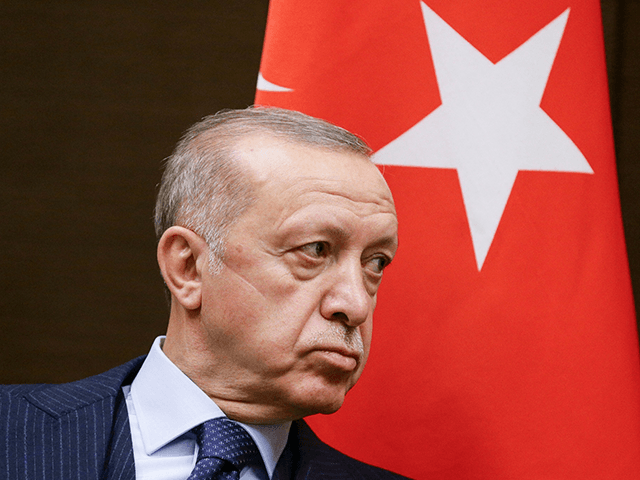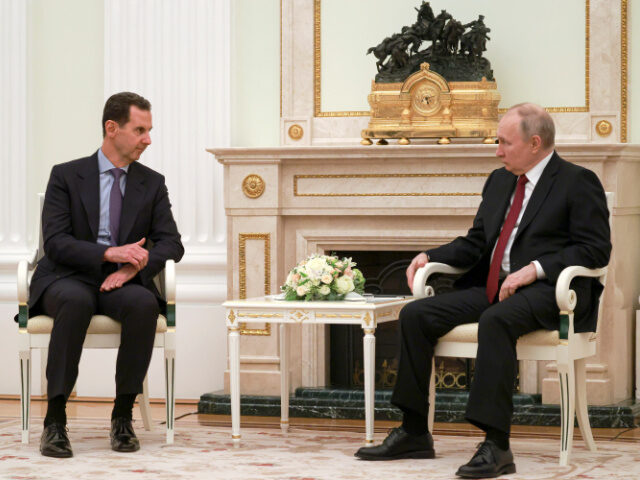Syrian dictator Bashar Assad during a visit to Moscow this week wholeheartedly supported Russia’s invasion of Ukraine, offering his government’s official recognition of the phony “independent republics” Russia carved out of eastern Ukraine, and said he would like more Russian forces stationed permanently in Syria.
Assad met with Russian dictator Vladimir Putin in the Kremlin on Wednesday to give thanks for his military support during the Syrian Civil War. He also thanked Putin for help after the massive February earthquakes in Turkey caused extensive damage and loss of life in Syria.
“Because this is my first visit since the start of the special military operation in Ukraine, I would like to repeat the Syrian position in support of this special operation,” Assad told Putin, using Russia’s preferred euphemism for the invasion.
“I say that these are Russian territories, and even if the war had not happened, these are historically Russian territories,” Assad said of the ersatz “republics” of Donetsk and Luhansk Putin declared at the outset of the war.
In an interview with Russian state media on Thursday, Assad said he would welcome more Russian military bases and permanent garrisons of Russian troops on his soil.
“We think that expanding the Russian presence in Syria is a good thing. Russia’s military presence in any country should not be based on anything temporary,” he said.
“We believe that if Russia has the desire to expand bases or increase their number, it is a technical or logistical issue,” he added, suggesting the Russians have not actually approached him about increasing their footprint in Syria yet.
Assad was considerably less enthusiastic about the presence of Turkish troops on Syrian territory. He told a Russian television interviewer that he would not meet with Turkish President Recep Tayyip Erdogan (or, presumably, his successor after a possible loss in the May 14 election) until Turkey is “ready and without any ambiguity to exit completely from Syrian territory and end its support of terrorism and restore the situation that prevailed before the start of the war on Syria.”
Assad was referring to a series of incursions Erdogan launched into Syria to push Kurdish militant groups back from the Turkish border. Erdogan considers all armed Kurdish groups in Syria to be extensions of the PKK, a violent Kurdish separatist group in Turkey.

Turkish President Recep Tayyip Erdogan listens to Russian President Vladimir Putin during their meeting in the Bocharov Ruchei residence in the Black Sea resort of Sochi, Russia, Wednesday, Sept. 29, 2021 (Vladimir Smirnov, Sputnik, Kremlin Pool Photo via AP).
In a similar vein, Assad considers all groups that oppose his dictatorial rule to be “terrorists.” Turkey has been working with Syrian militias in its campaign against the Kurds.
Relations between Turkey and Syria are strained even without the PKK situation. Turkey was an early supporter of the rebellion against Assad, which is why a network of opposition groups was ready to assist when Turkey launched its first operation on Syrian soil in 2016.
In 2017, after Assad blocked humanitarian aid into rebellious areas of Syria, Erdogan called him a “terrorist involved in state terrorism” and questioned if Syrians could “embrace the future with a president of Syria who killed close to one million of its citizens.”
The Assad regime fired back by accusing Turkey of supporting “takfiri [false Muslim] terrorism” by invading Syria and joining forces with anti-Assad militia. For good measure, Assad’s media derided Erdogan as a paranoid fool who still aspires to rule the long-dead Ottoman Empire.
Assad told his Russian interviewers on Thursday that Putin’s regime has made a strong effort to restore relations between Syria and Turkey, but the effort will go no further unless Turkish forces withdraw.
“We trust the Russian side who has played a mediator role to facilitate the communications, but within the basis of Russian policy of respecting sovereignty of states … and the exit of illegal foreign forces from Syrian territory,” he said.
The Turkish Foreign Ministry said on Thursday that a meeting of foreign ministers from Russia, Turkey, Iran, and Syria, which was scheduled for Wednesday and Thursday in Moscow, was postponed for “technical reasons.” No reschedule date for the talks was provided.

COMMENTS
Please let us know if you're having issues with commenting.